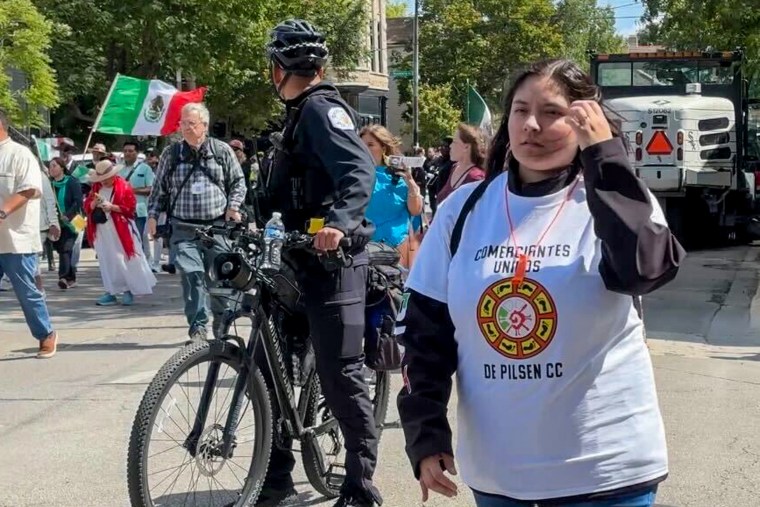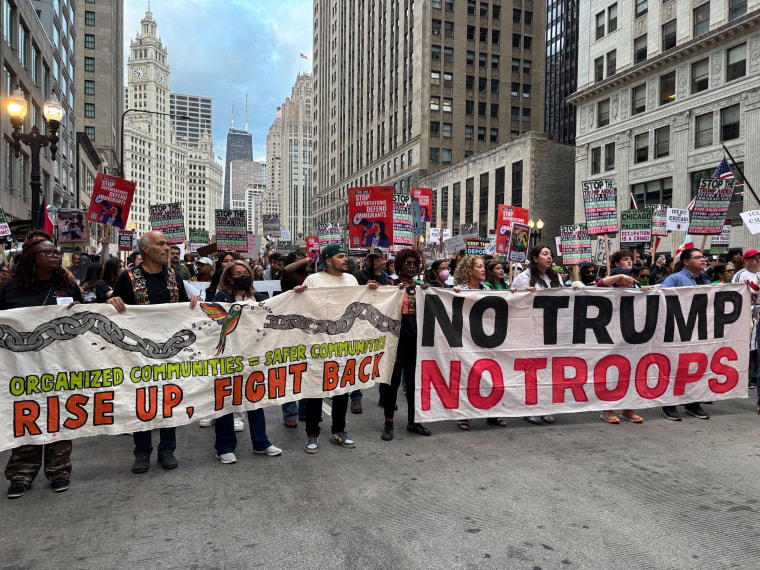CHICAGO — President Donald Trump’s plan to dispatch National Guard troops and immigration agents into Chicago has put many Latino residents on edge, prompting some to carry their U.S. passports while giving others pause about openly celebrating the upcoming Mexican Independence Day.
Though the holiday falls on Sept. 16, celebrations in Chicago span more than a week and draw hundreds of thousands of participants. Festivities kicked off with a Saturday parade through the heavily Mexican Pilsen neighborhood and continued with car caravans and lively street parties.
But this year, the typically joyful period coincides with Trump’s threats to add Chicago to the list of Democratic-led cities he has targeted for expanded federal enforcement. His administration has said it will step up immigration enforcement in Chicago, as it did in Los Angeles, and would deploy National Guard troops to help fight crime.
In addition to sending troops to Los Angeles in June, Trump deployed them last month in Washington, D.C., as part of his unprecedented law enforcement takeover of the nation’s capital.
“I love the smell of deportations in the morning,” Trump wrote on his social media site Truth Social on Saturday, making a reference to the 1979 war film “Apocalypse Now.” Trump continued, “Chicago about to find out why it’s called the Department of WAR.”
State and city leaders have said they plan to sue the Trump administration.
“The President of the United States is threatening to go to war with an American city. This is not a joke,” Illinois Gov. JB Pritzker, a Democrat, wrote in a post on X on Saturday, responding to Trump’s post. “This is not normal. Donald Trump isn’t a strongman, he’s a scared man. Illinois won’t be intimidated by a wannabe dictator.”
Although details about the promised Chicago operation have been sparse, local opposition is already widespread and includes suburban areas with their own immigrant communities.
“Fear is contagious, but so is courage,” Noche Diaz, an activist with Revcom Corps Chicago who attended Saturday’s parade, told NBC News. “And people who are decent and who do not want to see a fascist America with masked, heavily armed thugs rounding up brown people and terrorizing Black people need to start mass noncompliance and refusal to accept this.”
Mixed feelings about postponing festivities
The extended Mexican Independence Day celebrations reflect the size and vitality of Chicago’s Mexican American community. Mexicans make up more than one-fifth of the city’s total population and about 74% of its Latino residents, according to 2022 U.S. census estimates.
Organizers of the regular community parades and festivals have been divided over whether to move forward with precautions or to postpone in hopes that it will feel safer for many participants to have a true celebration in several months’ time.
In Pilsen, organizers said this week that community safety should be prioritized. A downtown Mexican Independence Day festival set for next weekend, though, was postponed this week by organizers, who said the decision was made to protect people.
“But also we just refuse to let our festival be a pawn in this political game,” said Germán González, an organizer of El Grito Chicago.
In Pilsen and Little Village, two of the city’s best-known neighborhoods with restaurants, businesses and cultural ties to Mexican culture, residents expressed disappointment at the fear and anxiety the potential federal intervention was instilling within the community during a time of year usually characterized by joy, togetherness and the celebration of Mexican American culture and heritage.
Some residents plan to celebrate with precautions
For Galiela Mendez, the decision to postpone El Grito Chicago was both heartbreaking and understandable.
And while the nation’s third-largest city has its problems, including persistent gun violence in some areas, Mendez said Trump and his supporters are maligning Chicago for political gain while disrupting festivities for a large cross-section of the population.
“It feels like a slap in the face,” the 25-year-old said. “I think we are all on edge because it’s the same people that describes our home this way, but they never come here and see it for themselves.”

Vianney Alarcon, 42, said she expects people to be targeted by immigration officials regardless of their legal status.
“They’re just going to catch and ask questions later,” she said.
But in an act of defiance, she’ll be taking part in the festivities, while bringing along her passport.
“I’m still going to celebrate my heritage,” she said. “And I know for a fact that a lot of the people I know and the people commenting on Facebook are going to show up, too. What are they going to do? We’re not being disruptive if we’re celebrating properly.”
An air of uncertainty
Fabio Fernandez, 39, owner of 3W We Will Win, an art and T-shirt company with a residency at a Pilsen streetwear shop, called it “troubling” and “disheartening” that potential federal intervention was impacting Mexican Independence Day celebrations.
“We shouldn’t fear or feel like we can’t walk the same streets that we usually roam,” he said, adding that there was a mood of anxiety and uncertainty in Pilsen.
This anxiety has translated to lower sales and reduced foot traffic for local businesses like his, Fernandez said.
“The small businesses here can feel it, and other business owners will say the same thing,” he said.
Fernandez said supporting local Latino-owned businesses is among the best ways to show support during this time.
“Come back to 18th Street. Support small businesses here. They’re still working hard as hell to keep their businesses alive,” he said.
Alejandro Vences, 30, became a U.S. citizen this year, “which gives me some comfort during this time,” he said while eating pozole verde at 5 Rabanitos, a local Mexican restaurant, on Friday afternoon.
Still, he said the anxiety is palpable.
“For us, our Independence Day has always been a celebration of our culture,” he said. “It’s always been a celebration of who we are. It feels like we don’t get to celebrate our culture in the same way.”
Rigoberto González Jr., an organizer with the United Merchants of Pilsen Chamber of Commerce, said that he consulted with local businesses ahead of Saturday’s parade, fearing that they might not want to participate this year.
He was wrong.
“We went to visit them, talk to them, and it was a resounding yes. Everybody wanted to make it happen,” he told NBC News. “And so here we are proud to celebrate our culture.”
“The climate might have changed, but we’re just doing business as usual,” he added.
Protest in downtown
Also Saturday, at least a thousand people marched through downtown Chicago in protest of increased ICE activity and federal agents in the city.
Jennifer Lezama, whose family emigrated from Guatemala, said people who work hard and pay taxes shouldn’t have to fear they will be deported because they don’t have a Social Security number.
“I think that we need to unite, and we definitely need to speak up and not fear the fact that — because we do have a voice — that we will be deported,” she said.

Mary Zangs, another protester, said there is no reason for National Guard troops to be sent to the city.
“You can’t believe it’s happening in our country,” she said. “Everybody’s enjoying the summer in the city. And for them to come, it’s absolutely ridiculous. Pathetic.”


